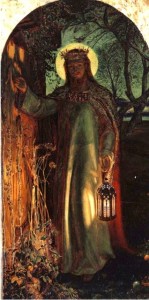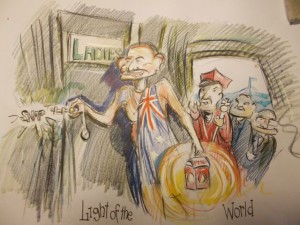Man as Machine (part three)
by TARQUIN O’FLAHERTY.
Christopher Marlowe was stabbed to death in a London pub. He was 29 and a spy in the pay of Sir Francis Walsingham, the Virgin Queen’s secretary and England’s Spymaster. Though deemed accidental, it is widely held that his death was political.
Besides spying, Marlowe had a part-time job. He was the most popular playwright in England.
The English are a strange race. They value honour above all else, and especially when it’s acquisition requires treachery and murder. The country’s single minded pursuit of honour through treachery has become so ingrained that its peoples consider the appellation ‘Perfidious Albion’ a hard earned, worthwhile, blue ribbon award. (Perfidious, of course, means treacherous, faithless, deceitful and false).
It mattered not a jot to Walsingham that Shakespeare worshipped the ground Kit Marlowe walked on. Recruited (*like Burgess and Maclean) while studying at Cambridge, the author of Dr Faustus and the Jew of Malta became a part-time spy who, at the age of 29, was deemed to have outlived his usefulness. A pub brawl was concocted, Marlowe died, and a plea of self defence got his fellow ‘brawlers’ completely off the hook. It was, of course, a complete and utter coincidence that those involved in the death were both Walsingham’s men.
Marlowe’s ten years of part-time spying was a little unusual. Generally the English spy business tended to be a bit more haphazard, with agents recruited on the spot when ever the need arose. It wasn’t until the late 19th century that a proper professional approach was adopted and spying became a recognised profession, like undertaking, or embalming, or hanging.
William Melville was born in 1850, in Sneem, County Kerry, in the south of Ireland. His parents had the local pub and bakery but in the wake of the Famine, which both devastated and depopulated the country, a decision was made to sell up and move to England. By the early 1860’s, this entire Irish Catholic family had sold up and were trading in London.
William worked with his parents to help establish the business, but his sights were set elsewhere. He joined the London police force in 1872. Ten years later he was involved in the founding of the Irish Special Branch whose brief was to root out Anarchists and Fenians. He was brought back to London in 1888 to help protect both the Shah of Persia and the Royal Family against an assortment of plots. Five years later he is astonishingly, Superintendent of Scotland Yard Special Branch, a semi secret organisation with a shadowy network of informers and spies. By 1901 he is liasing with the German Secret Service to protect the Kaiser who is in London to attend Queen Victoria’s funeral. Throughout all of this, Melville has been attempting to establish, through the War Office, a properly defined secret intelligence agency. By 1909 The War Office has agreed to his requests and new Departments of Military Intelligence are established, numbering One to Nineteen. Amongst these are the now familiar MI.5 and MI.6. By the time WW1 swings into action, Melville is absolute head of the British Secret Service and has established a school for spies in Whitehall.
From now on the Head of this highly secret organisation will be referred to only by a single letter from the alphabet, which may or may not be the initial letter of that person’s surname.
There can be no doubt that this is where Ian Fleming’s James Bond novels took the idea, and even the initial ‘M’.
Sadly, Melville died of kidney failure in 1918.
His son, Sir James Melville K.C. eminent barrister, MP for Gateshead, and Solicitor General in Ramsay McDonald’s government, appealed unsuccessfully against the obscenity decision in “The Well of Loneliness’ case.
‘The Well of Loneliness’ (1928) written by Radclyffe Hall, was a lesbian novel which utterly scandalised English society at the time.
*Burgess and Maclean, along with Blunt and Philby, fed classified information to the Soviet Union from Britain from the 1930’s to the 1950’s until they were finally exposed. They had been recruited by the Russians while still attending university at Cambridge. They were called “The Cambridge Four’.
TO BE CONTINUED





